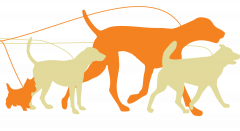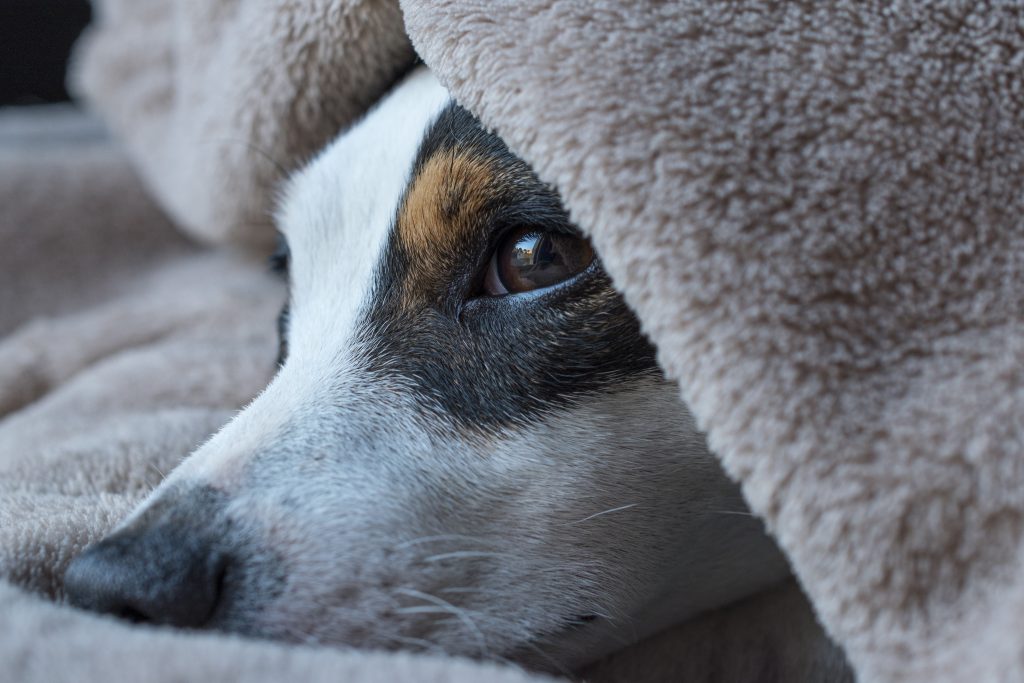
Annabel P/Pixabay
As the days get shorter and temperatures plummet many of us suffer from the winter blues. This year there’s a double whammy as we’re already feeling the stress of Coronavirus Cabin Fever. While we find ways to cope with boredom, restlessness, and irritability this time of year, it’s important to remember that our dogs can also suffer from the winter blues.
Experts at the Animal Behavior College (ABC) say that being housebound for extended periods can result in restlessness for dogs. Just like us, dogs can get bored and depressed when cooped up indoors for long periods. Restless or bored dogs may bark howl or whine, have indoor accidents, scratch at doors, and/or nibble furniture, carpet or shoes.
Following are 6 ways to help your dog beat the winter blues
1. Maintain a Regular Walking Routine
While letting your dog run around the backyard does allow him or her to let off steam in a safe environment, it’s not a substitute for taking your dog for a walk. In a PetMD article “Walking Your Dog vs. Just Letting Your Dog Out in the Backyard,” Dr. Pam Reid, a certified applied animal behaviorist said dogs thrive on variety.
“Most dogs enjoy seeing different things, smelling new smells, feeling novel substrates under their feet, and hearing unfamiliar sounds,” Reid said.
Often owners can walk their dogs morning and evening but finding time to take them out during the day is challenging. Hiring a professional dog walker is a great way to break up your dog’s day. Going on an outdoor adventure with a favorite walker is a highlight of the day for many dogs.
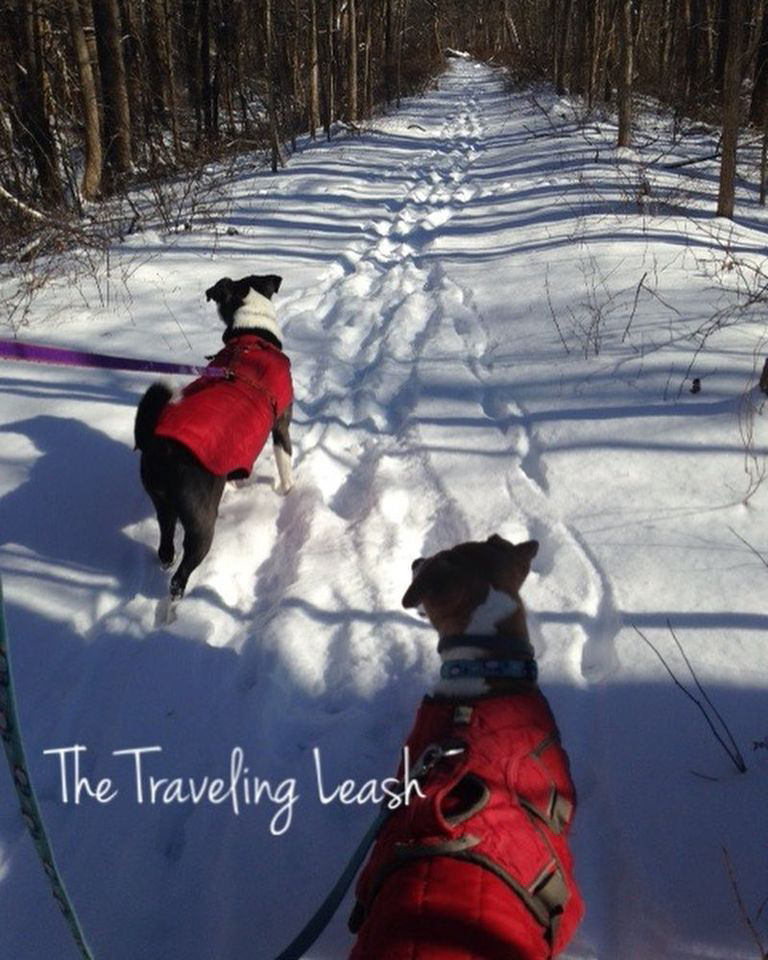
Pepper and Dutchess enjoy a snowy adventure with a staff member from The Traveling Leash dog walking company in New Windsor.
“Finding a responsible walker gives owners peace of mind knowing that their dog is in safe hands and getting the exercise they need to keep them happy and healthy,” said Erin Talarico, owner of The Traveling Leash dog walking and pet sitting company that serves New Windsor, Cornwall, Salisbury Mills, and Washingtonville.
When choosing a dog walker experts at the American Kennel Club (AKC) suggest tapping into your network. Talk to friends and other dog owners to see if they can suggest someone. You can also ask the veterinary staff at your animal hospital or the staff in your local pet store for a referral.
The AKC offers tips on the questions you should ask when interviewing professional dog walkers. While we’re living with the pandemic, be sure to ask about the company’s safety precautions.
When The Traveling Leash reopened after the March lockdown it had a COVID-19 protocol in place.
“Our new rules and regulations are designed to protect staff and clients,” Talarico said.
To help prevent the spread of COVID-19 The Traveling Leash staff:
- Sanitize their hands between visits to clients’ homes
- Use their own leashes
- Wear masks when interacting with clients
- Honor individual client requests
- Maintain social distancing on walks
- Never allow dogs to interact with other dogs or people (this is standard company policy) while on walks
- Avoid touching surfaces as much as possible when in a client’s home
- With permission, use their own treats for dogs
Talarico said clients are asked to leave all pet-related items as close to the entry door as possible to cut down on time staff members need to spend inside the home.
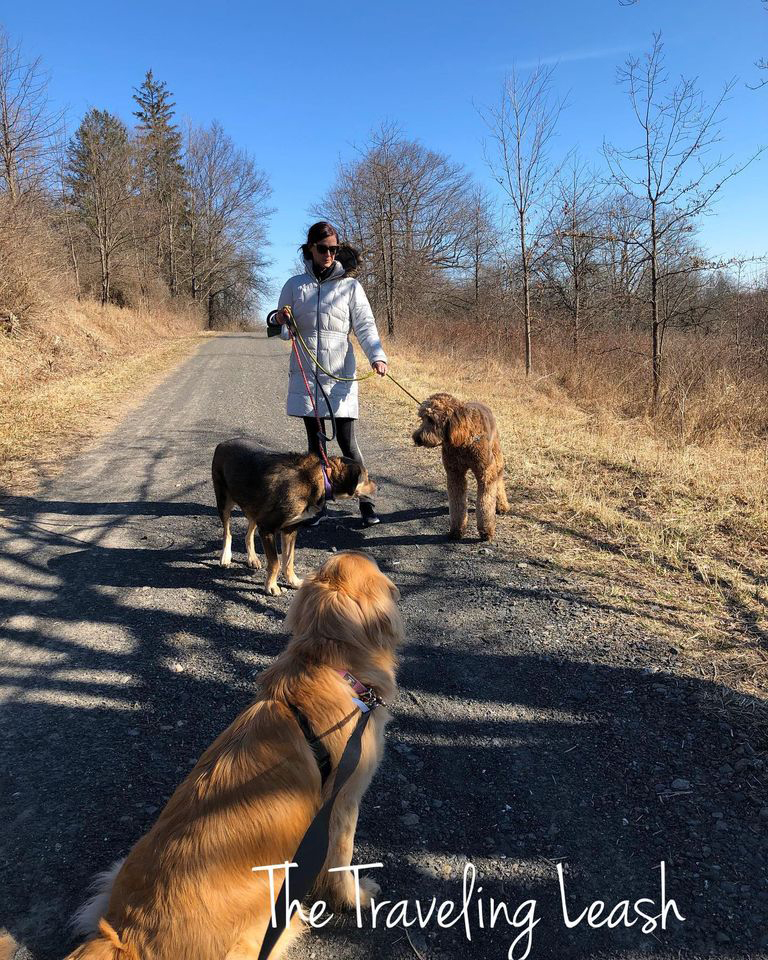
The Traveling Leash also offers trail hikes to break up a dog’s day with longer outdoor adventures.
2. Enroll your dog at a daycare center
When the weather prevents you from giving your dog sufficient outdoor exercise indoor doggy daycares can be an excellent solution. Enrolling your dog in a doggy daycare a few days a week or even for half a day helps release pent-up energy as he or she plays with other dogs and makes new friends.
But be aware that doggy daycare isn’t for every dog say experts at the ASPCA. Good candidates are healthy, spayed or neutered and well-socialized dogs who enjoy other dogs. If your dog is aggressive around other dogs, daycare is not a good option. Also, dogs who are fearful, tense, or anxious may not enjoy the fun and games at a daycare center. For these dogs, hiring a dog walker to provide much-needed exercise is a better solution.
Christian Terwilliger, owner of Playtime Doggie Daycare in New Windsor said all newcomers to his daycare are temperament tested to make sure they are suitable for the environment.
“As long as they’re good with other dogs and up to date on their vaccinations, they’re usually good to go,” Terwilliger said.
While overly nervous dogs may not be a great fit for daycare, Terwilliger said if done correctly daycare can help make some of these dogs more comfortable and confident around other dogs and new people.
Dogs exercise and socialize in a cage-free environment at Playtime Doggie Daycare. The facility has lots of fun play equipment for climbing and sliding and cubby holes for hiding along with cots for naptime.
“It’s super important to keep dogs socialized with other dogs as they mature and daycare offers a controlled environment where everyone has been temperament tested and vaccinated,” Terwilliger said.
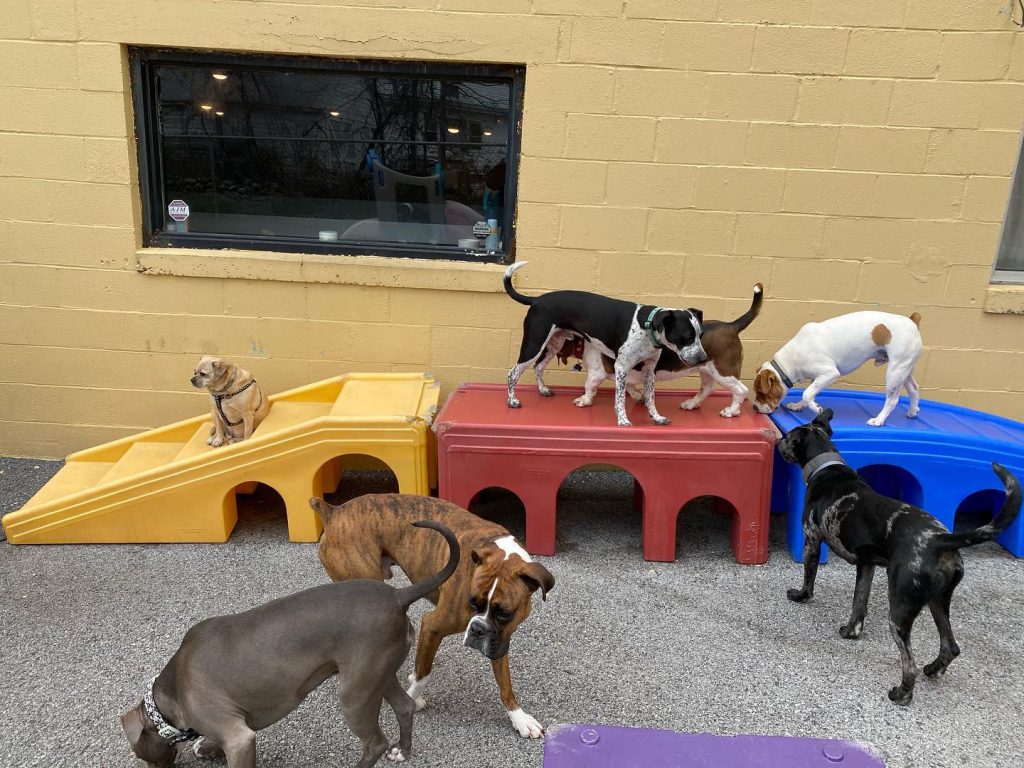
Friends hanging out together at Playtime Doggy Daycare in New Windsor.
Preventive Vet provides a list of questions to ask before choosing the right daycare facility for your dog. Safety procedures during the pandemic should also be part of the discussion.
While daily cleaning and sanitizing is standard practice at the New Windsor daycare staff now take extra precautions to help prevent the spread of COVID-19. Safe distances are maintained during pick-up and drop-off and hands are sanitized between leash exchanges.
“Everyone has their own spot where their leashes and jackets and everything is hung up, so there isn’t really any cross-contamination,” Terwilliger said.
For the safety and functionality of the facility Playtime Doggie Daycare is not accepting new customers. When new spots do open up an announcement will be posted on Instagram and Facebook.
“Safety of the dogs is the most important aspect and putting a cap on it while I had such a great crew seemed like the right thing to do,” Terwilliger said. “I honestly couldn’t have asked for a better more fun group of dogs.”
3. Take time out for short training sessions
Ken Nolte, owner of Etlon Training gets lots of calls in the weeks after Christmas from families who got pups as gifts and need help with behavioral problems. These problems can escalate when puppies don’t get enough exercise outside because of ice and snow or frigid temperatures.
“When a dog can’t relieve his pent-up energy that’s when you’ll see the biting and nipping type of play for longer periods of time,” said Nolte, who works with dogs in the Middletown, Poughkeepsie and Newburgh area. “Bored dogs will also start getting into things they usually don’t get into like the trash or the cat’s litter box or they will start chewing shoes.”
Nolte said the solution is to provide the dogs with alternatives such as engaging them in short training sessions. He recommends owners engage with the dog a few times during the day by asking for sit stays, downs, or playing hide and seek with family members.
“Training is a great way to relieve pent-up energy,” Nolte said. “I’ll leave someone’s house after doing an hour’s training session and the dog is always asleep.”
4. Enroll in a class
Another training option is to take your dog to a group obedience class. This could be beginner classes for new puppies or advanced obedience classes or maybe teach your dog some new skills. The AKC Canine Good Citizen (CGC) program lays the foundation for other AKC activities such as obedience, agility, tracking, and performance events. The program is open to purebred and mixed breed dogs and is designed to enhance the bond between owners and dogs.
If you’re not comfortable participating in group classes during the pandemic, the AKC offers a video series that takes you through the 10 required CGC skills. However, you will need to work on socialization skills preferably by attending group classes before taking the CGC test.
Professional Dog Trainer and CGC Evaluator Jennifer Culver, who owns Vom Kugelblitz Kennels and Focused K9 Training in Catskill, NY, said there are many benefits to achieving CGC Certification:
- A lot of homeowners insurance companies will give discounts if your dog has CGC Certification.
- Many people use the certification as a jumping-off point for entering other competitive sports or enrolling in therapy dog programs.
- This training required to earn CGC certification is wonderful if you want a well-mannered dog who you can take everywhere with you.
5. Play games at home with your dog
To find the best games for your dog, research his or her breed traits. For example:
- Labradors were bred to retrieve small game and objects and will respond well to fetch or hide-and-seek types of games.
- Herding group dogs, such as border collies or Australian shepherds were specifically bred to herd livestock. For these dogs, many trainers recommend laser-pen beam games. By moving the beam in various directions, dogs get the sense that they are “herding” the beam.
- Anyone who shares a home with a member of the hound dog group like beagles or basset hounds knows that they are motivated by scent. These dogs can be kept busy searching for treats that have been hidden around the house.
“Fun nose work training can be done with pet dogs that allow people to actually enter competitions and test their dog’s abilities,” said Culver, who has been working with search and rescue dogs as well as police, narcotics, and bed bug dogs for more than 10 years.
Modern Dog Magazine offers great ideas for playing fun scent games when cooped up indoors with your dog.
6. Keep dogs stimulated with toys and bones
There’s certainly no shortage of dog toys and bones on the market and choosing the right one for your dog can be challenging. Here are some things to consider:
Squeaky Toys
Nolte cautions against allowing dogs to use squeaky toys as chew toys.
“People will complain to me that their dogs ripped out the stuffing or got at the plastic squeaker and destroyed it,” Nolte said. “These toys are really meant for human-to-dog interaction or for dogs to chase around the house.”
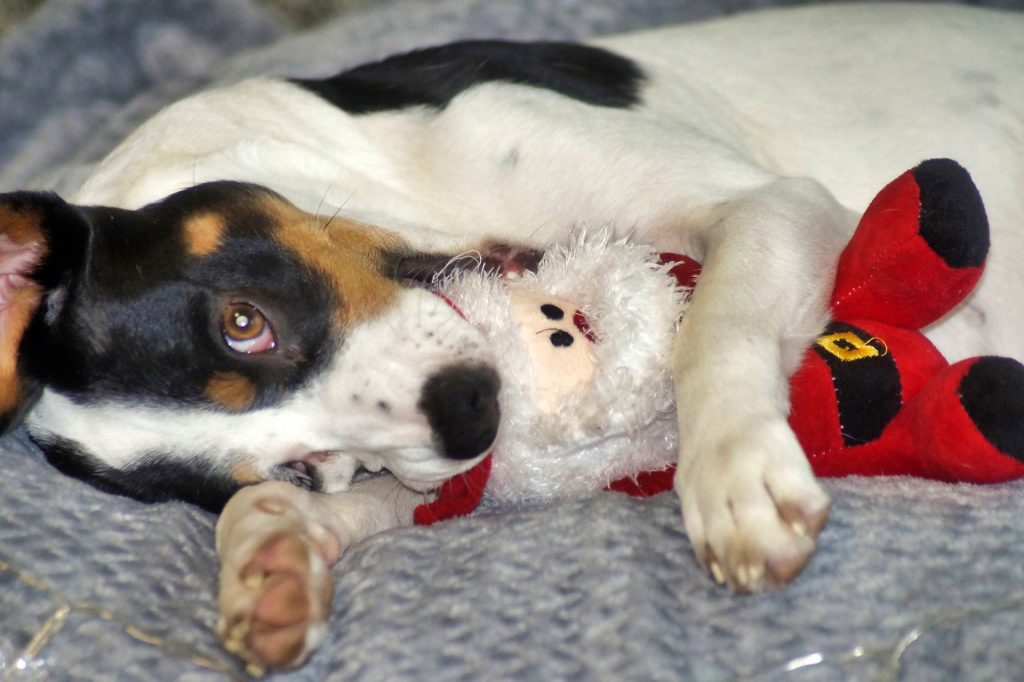
Marzena P/Pixabay.
Tug-of-war toys
Nolte recommends sturdy rope type toys for tug-of-war games. Never leave these toys lying around for your dog to chew as they can swallow bits of the rope and it can lead to intestinal problems. During tug of war games there should be a fair amount of owner win and dog win to keep the dog interested, Nolte said. There’s also training involved as the dog should learn to let go of the toy when the owner says “give.”
Satisfy Dog’s Chewing Instincts
Rawhide bones are a common treat for dogs but are not recommended by many veterinary experts. According to veterinarians at WebMD, in addition to posing choking risks, rawhides can cause blockages and digestive irritation. Instead, Nolte recommends his clients get bully sticks or flavored bones such as Benebones or Nylabones.
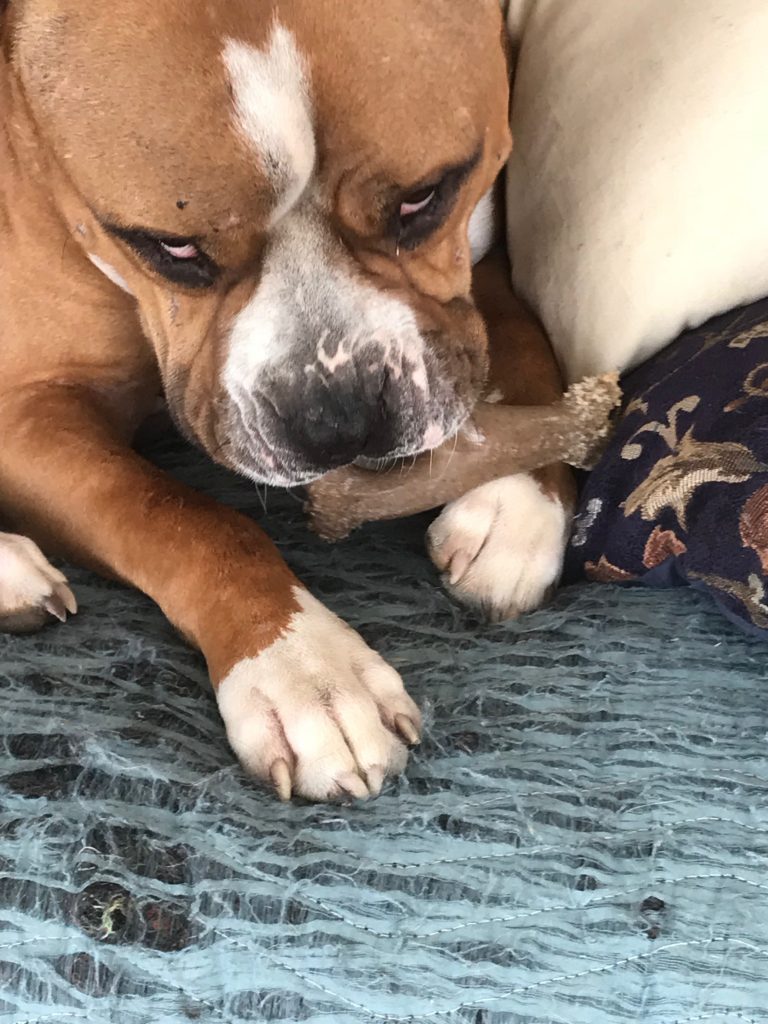
Ken Nolte’s mastiff/boxer mix Ben enjoys chewing on a Benebone.
Both Nolte and Culver recommend stuffing Kongs or uncooked marrow bones with peanut butter, treats, or yogurt. These can be frozen overnight so that they will entertain your dog for a longer period when home alone. Ice cubes can also satisfy a dog’s chewing instincts. Nolte recommends filling an ice cube tray with chicken broth. This is especially good for puppies who are teething, the trainer said. For larger dogs consider filling a bowl with chicken broth and freezing overnight.
Offer a Puzzle Toy
Depending on the breed puzzle toys can provide fun entertainment. You can find a large round-up of puzzle toys on Amazon along with star ratings and owner reviews that might help you in deciding if one of these toys is right for your dog.
In general, though, Nolte is not impressed with puzzle toys.
“I gave one to a Great Dane who looked at it, picked it up with his jaws clamped down on the toy and all the treats dropped out,” Nolte said. “A border collie is going to figure out a puzzle toy in a few seconds. Retrievers might enjoy it the most, but unless a treat is really, really smelly I think most breeds aren’t going to bother with these toys.”
What Nolte does recommend is filling a cupcake tray with a dog’s favorite treats. Then lay the tray on the floor and cover each compartment with a different size ball from basketballs to tennis balls to golf balls.
“Dogs will use brain activity to figure out how to get to the treat,” Nolte said. “Some like the boxer will just knock everything over, while others will move the ball with their mouths or knock it away with their paws.”
The bottom line is instead of being depressed that you and the dog cannot get out as much on those cold winter days take advantage of this time of year to work on training and bonding activities.
“When owners take the time to work on training during the winter it will make springtime with your dog that much easier,” Nolte said.
